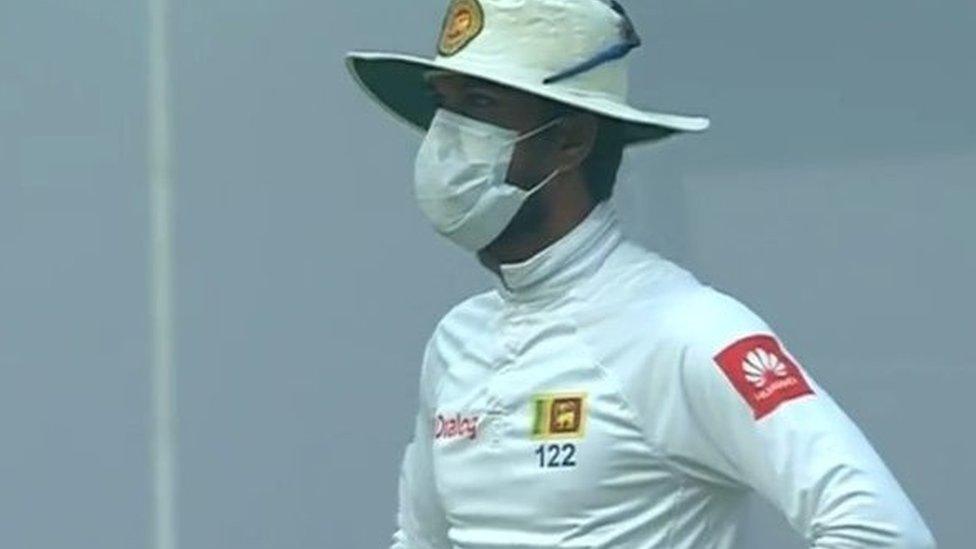Sri Lankan cricketers 'right' to take stand on smog
- Published

Sri Lanka captain Dinesh Chandimal was one of several players to wear a face mask while fielding
The Sri Lanka cricket team's decision to temporarily halt a Test match in Delhi because of pollution was right, says a medical expert.
India's capital has had toxic air quality levels for weeks.
On Sunday, it was "very poor" under World Health Organization guidelines - meaning heavy exertion is not advised.
"No one can play any games outside in this environment," Dr Prashant Saxena, chief pulmonologist at the Max Smart Super Speciality Hospital, said.
The visiting players wore face masks and there were just 10 men on the pitch at one point.
Many on social media mocked the team for stopping the match, and their decision caused a lot of anger in India.
This is the first time an international cricket match has been halted because of pollution levels in a host city.
Delhi smog: How many cigarettes is it equal to?
There were all kinds of allegations against the visitors, including by some Indian reporters. Many said it was a way for them to avoid further humiliation at the hands of the Indian team, who have dominated the series.
Allow X content?
This article contains content provided by X. We ask for your permission before anything is loaded, as they may be using cookies and other technologies. You may want to read X’s cookie policy, external and privacy policy, external before accepting. To view this content choose ‘accept and continue’.
Allow X content?
This article contains content provided by X. We ask for your permission before anything is loaded, as they may be using cookies and other technologies. You may want to read X’s cookie policy, external and privacy policy, external before accepting. To view this content choose ‘accept and continue’.
Allow X content?
This article contains content provided by X. We ask for your permission before anything is loaded, as they may be using cookies and other technologies. You may want to read X’s cookie policy, external and privacy policy, external before accepting. To view this content choose ‘accept and continue’.
But many others have jumped to their defence.
Dr Saxena told the BBC: "Any kind of physical exertion in this kind of air can cause difficulties in breathing, watery eyes and coughing - you need to be alert to play cricket, which is not possible in these conditions."
Additionally, he added that a cricket stadium may actually heighten the effects of pollution, saying: "Ventilation is lower in stadiums, which means one could inhale more dust particles and toxic fumes."
Dr Saxena added however, that the masks worn by the Sri Lankans would be useless against the toxic gases in the air, but conceded that "it made the right statement about the polluted environment".
Allow X content?
This article contains content provided by X. We ask for your permission before anything is loaded, as they may be using cookies and other technologies. You may want to read X’s cookie policy, external and privacy policy, external before accepting. To view this content choose ‘accept and continue’.
Allow X content?
This article contains content provided by X. We ask for your permission before anything is loaded, as they may be using cookies and other technologies. You may want to read X’s cookie policy, external and privacy policy, external before accepting. To view this content choose ‘accept and continue’.